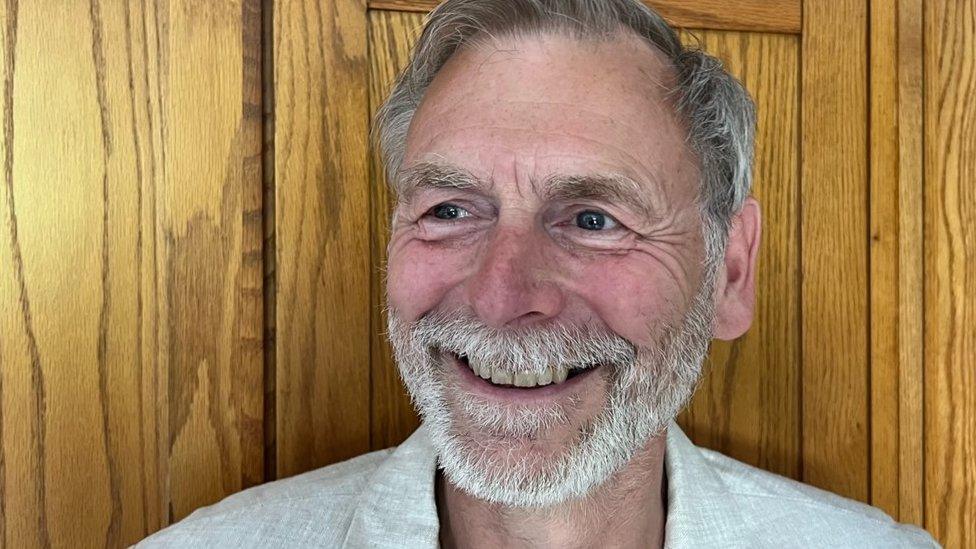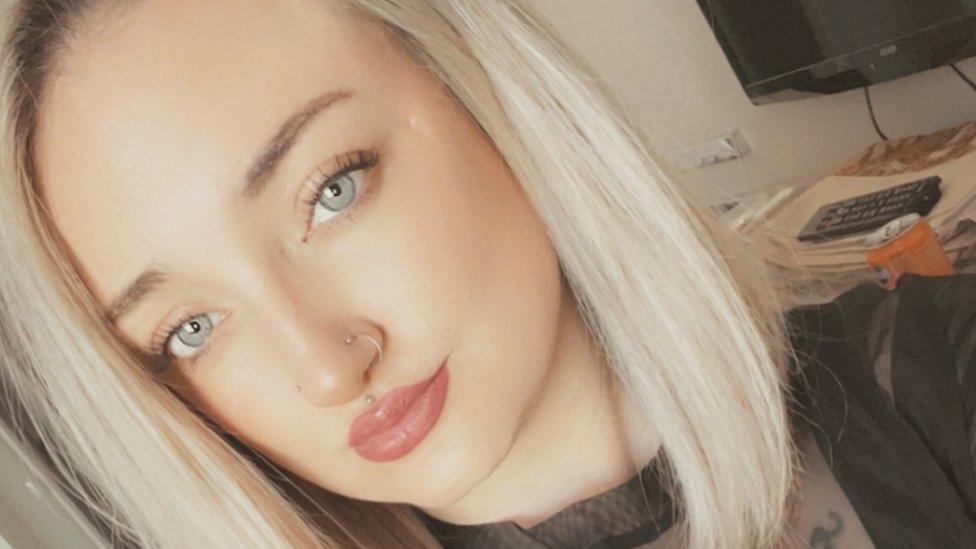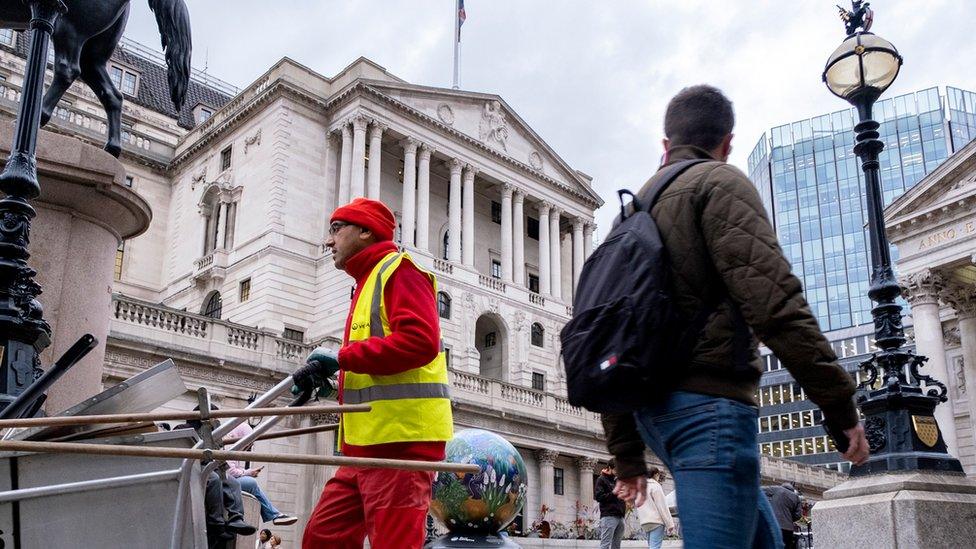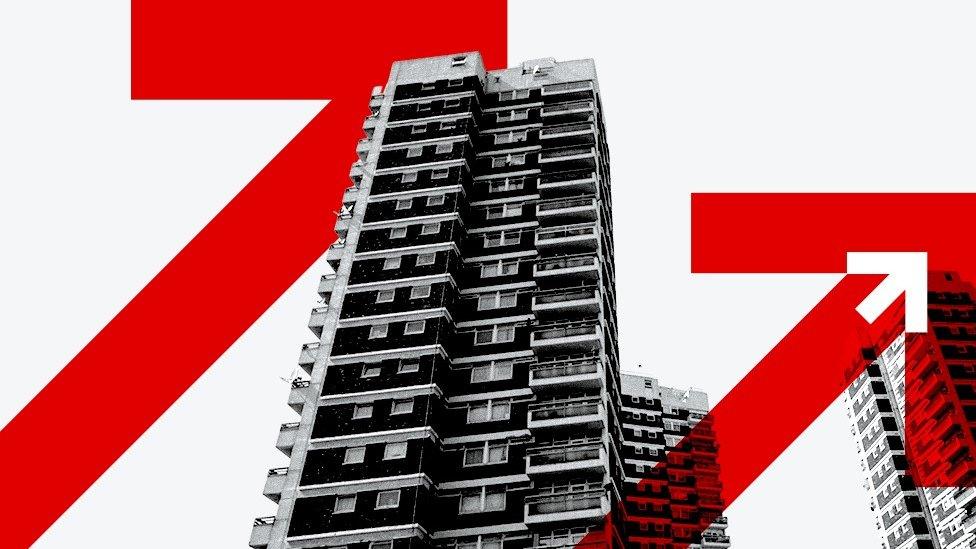'My savings are fast becoming worthless'
- Published

Andrew Snowdon describes himself as "not super-rich, not destitute"
The Bank of England has raised interest rates again to 5%.
The BBC hears from four people about how the latest decision by the Bank will affect them.
'My savings are fast becoming worthless'
Andrew Snowdon planned his retirement extremely carefully and should benefit from the consecutive rises in interest rates if the higher rates are passed on by his bank, but he says inflation means his savings are "fast becoming worthless".
The former software company owner, 63, from Great Yarmouth in Norfolk, describes himself as "not super-rich, not destitute with a few thousand in the bank".
"We thought we had enough to survive but our plans have been shot to hell by the effects of inflation," he says. "Savings don't keep pace with inflation and if you have kids, they're similarly impacted."
Andrew's children - aged between 25 and 36 - have all left home, but "none are high earners" and he and his wife have helped when they can.
"The youngest has been hit by massive rental costs," he says. "We feel stretched as a larger family, pulled in every direction. People don't understand how families work, it's not just one person who is affected, everyone is."
Andrew sees parallels with the financial crisis of 2008 and can "see it happening all over again". He says having lost 10% of his effective buying power, another rise in interest rates will not make a "massive difference in all honesty".
'Everything is just so stuck in this rut'

Cillian says a "more spartan lifestyle" is possible but seeing friends matters more
Aged 26 with a degree and living with their girlfriend who has a masters in nuclear engineering, guitar journalist Cillian Breathnach is "really, really worried" about what the future holds as far as owning a house is concerned.
The couple spend £1,400 a month on rent paying for their Bristol home. "It's a huge amount," they tell the BBC. "We could live a more spartan lifestyle to save for a deposit but our mental health is important too - going out and seeing friends matters."
Since the Bank of England began increasing interest rates in December 2021 and prices started to rise, so Cillian's capacity to save has diminished.
"Two years ago we were saving for a deposit, but the margin between the money we have for saving and spending has shrunk massively. We even had to dip into our savings to buy a dehumidifier to make sure the house doesn't get mouldy."
The musician says the contract on their current rental ends in December and if the rent increases they will have to move to a smaller, more affordable flat.
Cillian believes "something has to change" with the distribution of housing in the country. "Otherwise we'll be renting and paying someone else's mortgage indefinitely. The whole thing is not working properly, everything is just so stuck in this rut."
'I moved abroad to save up but still can't afford a mortgage'
Would-be first-time buyer Nick Andrew has saved tens of thousands to put down on a property when he eventually buys a home. But he had to move to Germany to do so.
The recruiter relocated to Berlin in 2019 because by the time he had paid £750 on rent to live in a shared house in London each month there was no money left for savings.
In Germany, an entire apartment, fully inclusive, costs €1,000 (£860) and he is paid more to do the same work than he was in the UK. His transport costs are less too - a €50 train ticket covers fares for a month.
"It's a no-brainer," the 29-year-old says. "Salaries are higher and the cost of living is lower."
He is now making plans to return home in January. "Financially, I'd be better off staying here, but the UK is where my family is. They're getting older and I'd like to be able to support them," he tells the BBC.
Ideally, he wants a two-bedroom property within striking distance of London. But while he has a handsome deposit, he says he can barely afford a mortgage as things stand.
He is looking at repayments of up to £2,000 on a £350,000 property, even with his deposit. "It's most of my basic take-home salary. It's really hard to see how that's feasible," he says.
If interest rates keep going up he says he will probably have to wait to meet someone before he can buy a home. "It's very disheartening to save such a lot of money, work very hard and it's still not enough."
'Essentially I've had to pay twice, and then some'

Sommer Tebenham says she will "reluctantly manage" regardless of the Bank of England's decision
After a year of pain from gallstones Sommer Tebenham from Hove in East Sussex ended up taking out a £5,000 bank loan to have surgery done privately in April.
Last month she told the BBC she paid because she feared she might have to wait 12 months with the NHS. The relief was instant, she says. "I was up walking around and eating again straight away."
However, she is now left with the pain of £272 a month repayments, which she has consolidated into another loan. The 18.9% APR (annual percentage rate) is only manageable because the she lives at home with her mother and has good credit, she tells the BBC.
"Furious" is how the learning disability care service manager describes herself. "I've paid tax and national insurance and have done since I was 18. I'm now 28. Essentially I've had to pay twice and then some, because of the interest on the loan."
Even if the Bank of England's rate rise leads to her APR going up, she says she will "reluctantly manage".
Additional reporting by Kris Bramwell and Emma Pengelly.
This story has been updated at the request of one of the contributors

How will the latest interest rate rise affect you? You can share your experiences by emailing haveyoursay@bbc.co.uk, external.
Please include a contact number if you are willing to speak to a BBC journalist. You can also get in touch in the following ways:
WhatsApp: +44 7756 165803
Tweet: @BBC_HaveYourSay, external
Please read our terms & conditions and privacy policy
If you are reading this page and can't see the form you will need to visit the mobile version of the BBC website to submit your question or comment or you can email us at HaveYourSay@bbc.co.uk, external. Please include your name, age and location with any submission.
Related topics
- Published22 June 2023

- Published20 June 2024

